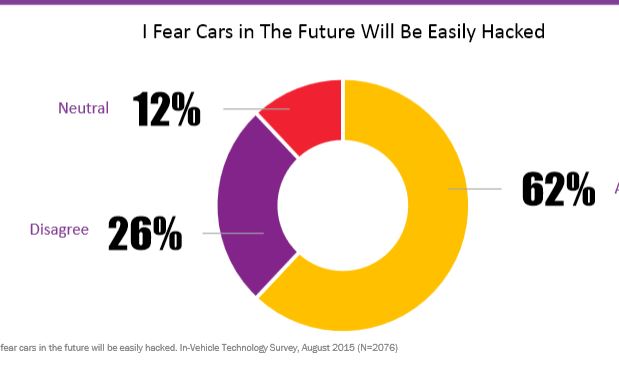 Although there has been vehicle hacking in the news lately such as the hacking and grounding of the Nissan Connect Leaf CARWINGS app and the Jeep Cherokee, last year most people are not worried. Only 26% of those surveyed recalled an instance of vehicle hacking in the past year, a sharp decline in awareness from nearly six months ago reported Kelley Blue Book after a survey. Drivers won’t give Android Auto or CarPlay either even if it increased chances of hacking.
Although there has been vehicle hacking in the news lately such as the hacking and grounding of the Nissan Connect Leaf CARWINGS app and the Jeep Cherokee, last year most people are not worried. Only 26% of those surveyed recalled an instance of vehicle hacking in the past year, a sharp decline in awareness from nearly six months ago reported Kelley Blue Book after a survey. Drivers won’t give Android Auto or CarPlay either even if it increased chances of hacking.
The findings were presented at the RSA conference where it was discussed that vehicle hacking almost inevitable. The presenters, Akshay Anand and Karl Bauer suggested that automakers could mitigate risks by providing incentives for security researchers to share their vulnerability findings.
In previous survey’s KBB found that 66% thought that any technology that comes in the car is an added bonus.
The survey found:
- The most common motive for hacking a vehicle is believed to be theft, according to more than half of respondents.
- Over 40 % of consumers support connected vehicles.
- 51% are reluctant to get a self-driving car.
- The top fears of driver is distracted drivers and impaired drivers.
- Consumers overwhelmingly feel that vehicle manufacturers, in particular, are most responsible in helping to protect them from any cybersecurity vulnerabilities that may exist in their cars.
- According to a previous vehicle vulnerability survey conducted in July 2015, awareness of hacking incidences has dropped substantially to just 26 percent of consumers being able to recall an instance of vehicle hacking from the past year.
- Millennials are the least likely of all generations to think vehicle hacking will be a frequent problem within the next three years (50 percent). In contrast, nearly 70 percent of all respondents believe the same.
- The majority of Millennials support vehicles becoming more connected (60 percent); however, 58 percent are reluctant to get an autonomous vehicle. In comparison, only 42 percent of all consumers support vehicles becoming more connected, and three-quarters are reluctant to get an autonomous vehicle.
- Among all generations, 56 percent of consumers believe that vehicle manufacturers should be the primary entities offering software to prevent vehicle hacking, and half of all consumers prefer they provide insurance to cover any potential losses should a hack occur.
- Forty-four percent of consumers think the vehicle manufacturer is most responsible for securing a vehicle from hacking vulnerabilities. More than two-thirds view vehicle manufacturers as partially responsible, even if a car is hacked through a mobile phone’s software or applications.
 KBB notes that average car on the road is over 11 years old, so most cars currently remain unconnected and safe to hacks.
KBB notes that average car on the road is over 11 years old, so most cars currently remain unconnected and safe to hacks.
Kelley Blue Book fielded this survey to 813 respondents visiting KBB.com from January 7-19, 2016. Kelley Blue Book’s Senior Analyst Karl Brauer and Analyst Akshay Anand presented these findings and more today at RSA Conference on March 1, 2016, in San Francisco. For additional details, please contact a member of the Kelley Blue Book Public Relations team.